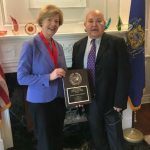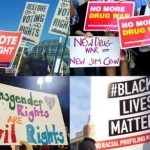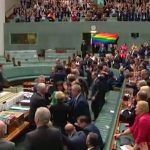
Openly gay Harvey Milk was elected to the San Francisco Board of Supervisors Nov. 7, 1977. It was a momentous moment in American history and helped open once closed doors to other LGBT leaders and professionals which no doubt improved lives far beyond San Francisco.
The fortieth anniversary of Milk’s election afforded us the opportunity to see a future of even greater political and corporate inclusion and even greater economic empowerment of individuals and communities. Corporations and local government agencies began a nationwide move to end workplace discrimination against LGBT employees. A federal law has been long in the works and long delayed.
Why the delay in federal anti-discrimination law for the LGBT community? Imperfect messaging and imperfect leadership on Capitol Hill in my view.
Imperfect Capitol Hill leadership in the form of stodgy, bedraggled, sarcastic, windbag Barney Frank is the major reason the LGBT community has no federal anti-bias law. Frank delayed coming-out until forced to do so in a Capitol Hill “call boy” scandal. Frank had to fight congressional charges he ran male prostitution services from his Capitol Hill office and his apartment.
I know Frank’s imperfect leadership firsthand. After the election of President Clinton is 1992, I became a founding member of the federal government organization Gays, Lesbians or Bisexual Employees (GLOBE). Technically, as was so often the case in the early 1990s, transgender employees were excluded in name but not in practice.
Organizers had GLOBE chapters in most federal agencies with large employee support, LGBT and straight. Support also came from the Clinton White House and administration officials like Secretaries Donna Shalala, Ron Brown, others and Attorney General Janet Reno.
On a professional level, I managed several programs to assist LGBT employees, traditionally excluded from job and career advancement information channels, gain access to employment openings and other career opportunities. Information on my work found its way to the office of U.S. Sen. Jesse helms, a North Carolina Republican.
Interestingly, Helms was first elected to the U.S. Senate Nov. 7, 1972. If readers are unfamiliar with Helms, I refer them to his 2005 memoir Here’s Where I Stand and to Dr. William A. Link’s 2008 Righteous Warrior: Jesse helms and the Rise of Modern Conservatism. Link writes briefly of my 1994 encounter with Jesse Helms.
Helms was angered about my work as an employment advocate for LGBT employees. He intended to stop it and fire me for prohibited political activity in the federal workplace. Helms saw the LGBT community as a political group within government because they largely supported Bill Clinton. I was Republican and had met Helms in Washington and political events in other states.
My political affiliation made no difference to Jesse Helms. He considered anyone who supported LGBT employment rights as an enemy to the U.S. government who needed immediate humiliation over C-SPAN and in the press. Dr. Link’s book is an excellent summary, over many pages, about the tactics Helms used to delay and prevent my work.
The Helms approach to demonize LGBT people, perhaps based on crude sexual images depicted in the media of his era, was brutal. In 1976, Helms wrote a campaign book, Where Free Men Shall Stand.
Helms revised the book in 1994 for a new chapter, among others, called How About Sodom and Gomorrah Anyhow? In this two-page chapter, Helms began by comparing political correctness with Nazism. He implied that to LGBT acceptance, a form of political correctness, would result in deaths of “millions of innocent people.” Talk about scare talk! The book is, as we say in government, “A Piece of work.” Jesse was as well.
In the main, Jesse Helms and Harvey Milk wanted freedom for American workers. Helms wanted freedom from government regulations and bullying; Milk wanted freedom from discrimination and lack of employment opportunity.
If Milk and Helms could have worked together, their legislation on workplace rights for LGBT employees might have achieved the long-needed freedoms we all want. An assassin’s bullet ended Milk’s career too soon. Helms went a different direction, likely based on negative media images and the criminalization of LGBT’s in his era, and opposed virtually all legislation to benefit the LGBT community.
In 2017, we are better for the brief work and long legacy of Harvey Milk and for a U.S. Senate where members have more positive views of the abilities of LGBT workers. Call for future success should not be Resist but Work!
Jim Patterson, Member California State Society, is a writer/speaker/blogger in Washington, D.C. JepDiplomat@gmail.com















